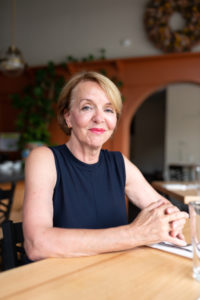Written by Laura Bonds for Project Green Fork
Sabine Bachmann, the owner of three Memphis restaurants, uses her European upbringing to minimize waste in her kitchens. Tonica, Ecco and Libro at Laurelwood have three distinct identities, but they all share a commitment to being green.
Born in Germany, Sabine aspired to become a veterinary doctor and made her way to Italy to study animal medicine. It was there she met her former husband who brought her to his hometown of Memphis and changed her path from aspiring vet to eventual entrepreneur. Her early days in Memphis focused on the wholesale wine business but quickly launched into food. Sabine realized “food was a vessel for me to sell wine.” After cooking at her house for wine buyers and expanding into catering, she opened her first restaurant, a downtown sandwich shop, Fratelli’s. Starting the business was hard, she reflected, and Fratelli’s never took off the way she hoped.
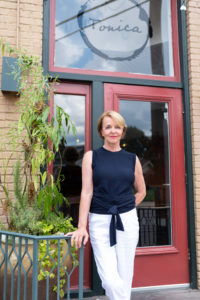
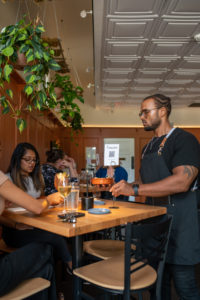
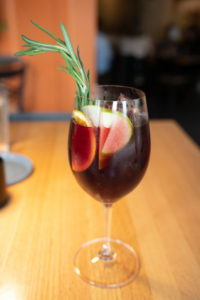
Sabine pushed onward and in 2014 opened Ecco on Overton Park. The charming restaurant and cozy patio invite guests, and the Italian-influenced menu of made-from-scratch cuisine keeps customers coming back. Fast forward to 2017 and the owners of Novel bookstore approached Sabine in hopes of a partnership. Thus, Libro at Laurelwood was born. If you’ve been in the bookstore, you’ve seen the restaurant bustling with guests, enjoying lunch breaks with colleagues, reconnecting with friends or settling in to have a bite to eat from Libro while they crack open their newly purchased books. Most recently, a neighboring building was vacated near Ecco, and Sabine took the opportunity to continue her entrepreneurial pursuits by opening Tonica, Memphis’ first tapas and Spanish-inspired restaurant. Nearly every wine served at Tonica is from Spain, and their gin and tonic variations transport you to another country until you step outside on a muggy summer day and remember you’re in Memphis.
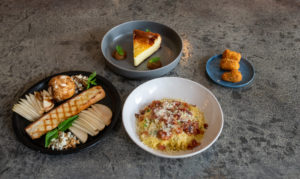
Sabine’s childhood in Germany instilled an appreciation for taking care of one’s surroundings and consciously limiting waste. “In Europe there is more of that going on,” Sabine mentioned, “it’s part of community.” Sabine brings compassion for her community in the care she shows her staff. She acknowledges her biggest hurdle in maintaining a sustainably-run restaurant is ensuring the staff believes in the cause too. Sometimes workers don’t contribute to the sustainable practices, but Sabine tries to build an environment that supports her employees by offering good benefits and reminding them of the importance of taking green measures.
The drive to minimize waste extends to all three of Sabine’s restaurants. Recalling a memory from her youth, Sabine explained that growing up in Germany, “when fruit falls from a tree you make something from it.” The fruit may bruise slightly or be technically imperfect, but there is an expectation that one uses what is available and avoids waste whenever possible. Biodegradable containers are used in the shops, and Libro and Tonica compost to mitigate food waste. Ecco’s outdoor patio limits composting abilities, but other green practices ensure sustainability remains top of mind. For example, the soft napkins on the tables at Tonica are 98% disposable and appropriate green cleaners are used at each restaurant.
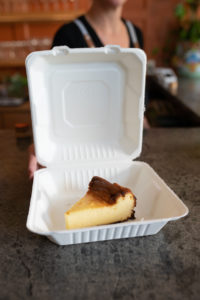

Since the early days of Clean Memphis’ Project Green Fork certification program, Fratelli’s was certified, followed by Ecco and Libro once they opened. Tonica is newer to the scene, but Sabine has no doubt it will get certified as the business already operates under certification guidelines. Her upbringing with a sense of community in mind has followed her to each business, and “To me, personally, it is important to do as much as possible,” Sabine said of contributing sustainable measures to her restaurants.
Looking ahead, Sabine hopes to implement renewable energy at her restaurants one day through measures such as rooftop solar panels. She challenges organizations like Clean Memphis to continue developing innovative ideas for businesses to operate sustainably and encourages government support of these efforts through legislation, especially for big restaurant chains with large carbon footprints. “Guidance is important,” she said when it comes to operating a green business and bringing others along.
From her young days as a girl in Germany to making her way to Memphis and establishing herself as an entrepreneur and four-time restaurant owner, Sabine remains committed to the ideals she learned when she was young: use what you have, avoid waste and support your community. She carries these values to each of her restaurants and inspires staff and patrons through her sustainable measures.
